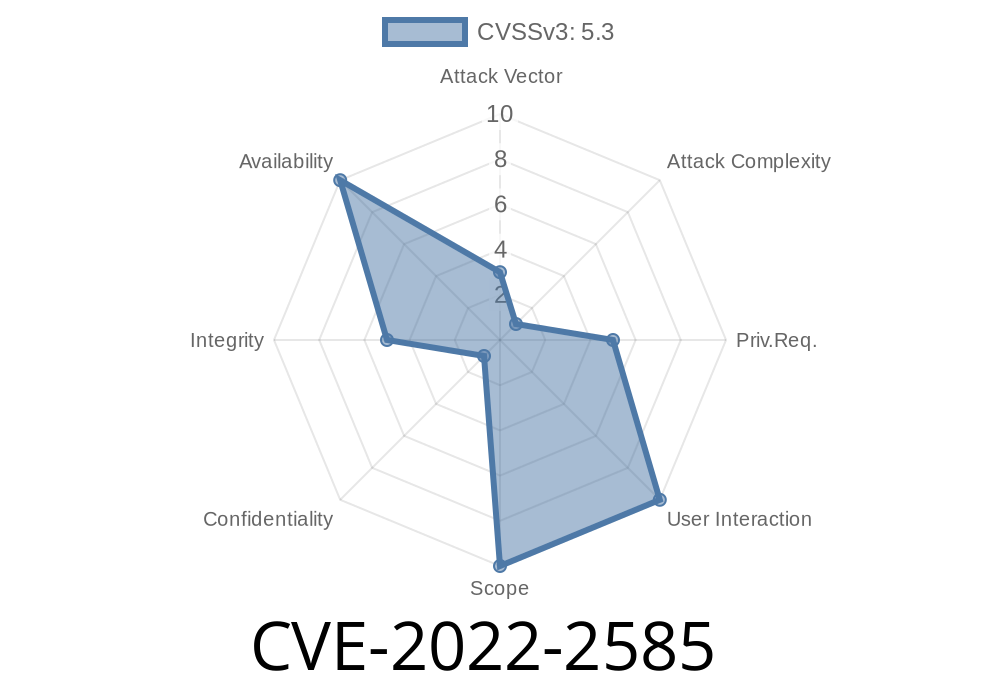In 2022, security experts discovered a critical kernel bug tracked as CVE-2022-2585, involving a use-after-free vulnerability in Linux’s process and timer management. This flaw, coming from a subtle corner case in how threads and timers interact, had the potential to let attackers crash systems or even execute code. Let’s break down how it worked, see a simplified code example, and look at what you can do if your systems might be affected.
What is CVE-2022-2585?
This vulnerability is related to POSIX CPU timers and how they are handled when a thread that is not the "group leader" calls exec(). When this happens, the kernel’s code could accidentally leave a timer on a list even after the memory it points to has been freed. If something else touches that timer, bad things can happen — from a crash to possible code execution.
The official description reads
> It was discovered that when exec'ing from a non-leader thread, armed POSIX CPU timers would be left on a list but freed, leading to a use-after-free.
This is mainly an issue if a program is using threads and has set CPU timers (say with timer_settime), and then one of the non-leader threads calls execve() to run a new program.
Technical Details
When you have a multithreaded process, there's a "leader" — usually the main thread that started everything. The other threads are "followers." Each thread can "arm" (activate) POSIX CPU timers, which are data structures that live in kernel memory and track how much CPU time the thread or its group uses.
The kernel is supposed to clean up the old process's timers.
- Due to a logic bug, it sometimes removes the timer from the list but doesn't actually remove its pointer from another global list.
Later, something else in the kernel touches that pointer — but the memory has already been freed.
This is the infamous "use-after-free," where freed memory is touched again, opening the door to attacks.
Visualizing the Problem With (Simplified) Code
Let’s look at a highly simplified pseudo-code to imagine what’s going on in the kernel.
// Simulated kernel list of timers
struct posix_cputimer {
struct posix_cputimer *next;
// ... timer fields ...
};
struct task_struct {
struct posix_cputimer *timers;
// ... process fields ...
};
// Thread 2 creates a timer
struct posix_cputimer *timer = kmalloc(sizeof(*timer));
thread2->timers = timer;
// Thread 2 does exec()
do_execve(thread2) {
// Free its timers
kfree(thread2->timers);
// BUG: The global list still points to the freed timer
// Later, kernel code walks the list:
process_timer(timer); // -> Use-after-free!
}
The real code is more complicated, but you can see the idea: the kernel *forgets* to unlink a pointer after freeing it, setting up unexpected trouble.
Exploit Details
While there are no known public exploits for this exact bug at this time, use-after-free vulnerabilities are extremely dangerous. Attackers can potentially:
Trick the kernel into running attacker-controlled code (escalation of privilege).
With control over thread behavior and timers — and if combined with other techniques (like heap spraying or kernel info leaks) — this bug could be part of a real-world attackchain.
Testing For The Bug (Conceptual)
Curious if your system might still be vulnerable? If you’re running a kernel version before the fix landed (see references below), and can write code, you could simulate the scenario:
#include <pthread.h>
#include <signal.h>
#include <time.h>
#include <unistd.h>
#include <stdio.h>
void *thread_func(void *arg) {
timer_t timerid;
struct sigevent sev;
struct itimerspec its;
sev.sigev_notify = SIGEV_THREAD_ID;
sev.sigev_signo = SIGRTMIN;
sev.sigev_value.sival_ptr = &timerid;
sev._sigev_un._tid = syscall(SYS_gettid);
timer_create(CLOCK_PROCESS_CPUTIME_ID, &sev, &timerid);
its.it_value.tv_sec = 1;
its.it_value.tv_nsec = ;
its.it_interval.tv_sec = ;
its.it_interval.tv_nsec = ;
timer_settime(timerid, , &its, NULL);
// Non-leader thread calls exec
execl("/bin/ls", "ls", NULL);
return NULL;
}
int main() {
pthread_t t;
pthread_create(&t, NULL, thread_func, NULL);
pthread_join(t, NULL);
return ;
}
(This code won’t crash your kernel, but is conceptually similar to what triggers the issue; use with caution!)
References and Fixes
- Red Hat CVE Database: CVE-2022-2585
- Ubuntu Security Notice USN-5677-1
- Kernel Patch Commit (lkml.org)
- NVD Details
The main kernel patch to fix this was merged in July 2022. The correct solution is to ensure that timers are properly unlinked from all lists *before* being freed in the exec scenario.
If you run Linux servers, desktops, or containers
1. Update your kernel. All major Linux vendors have released patches. Linux kernel 5.18.14, 5.15.57, and 5.10.133 and up have the fix.
Reboot after patching to load the new kernel. Just patching packages isn’t enough!
3. If you maintain software that uses POSIX timers and exec in threads, review your code — though the main responsibility is in the kernel.
Wrap-Up
CVE-2022-2585 teaches us that even deep, complex code in the Linux kernel can have subtle bugs with big security impacts. The sheer complexity of modern threading, process, and timer handling means vulnerabilities can show up in places most users — and even most programmers — never look.
Staying up to date and understanding how these bugs work helps everyone build more secure systems. If you want to dive deeper, check out the original kernel patch discussions and watch kernel mailing lists.
Further Reading
- Linux Kernel Archives
- POSIX Timers Manual
- Exploit Development for Kernel Use-After-Free (for a related but different bug)
*This article is written exclusively for your understanding. Share responsibly!*
Timeline
Published on: 01/08/2024 18:15:44 UTC
Last modified on: 01/08/2024 19:05:05 UTC
